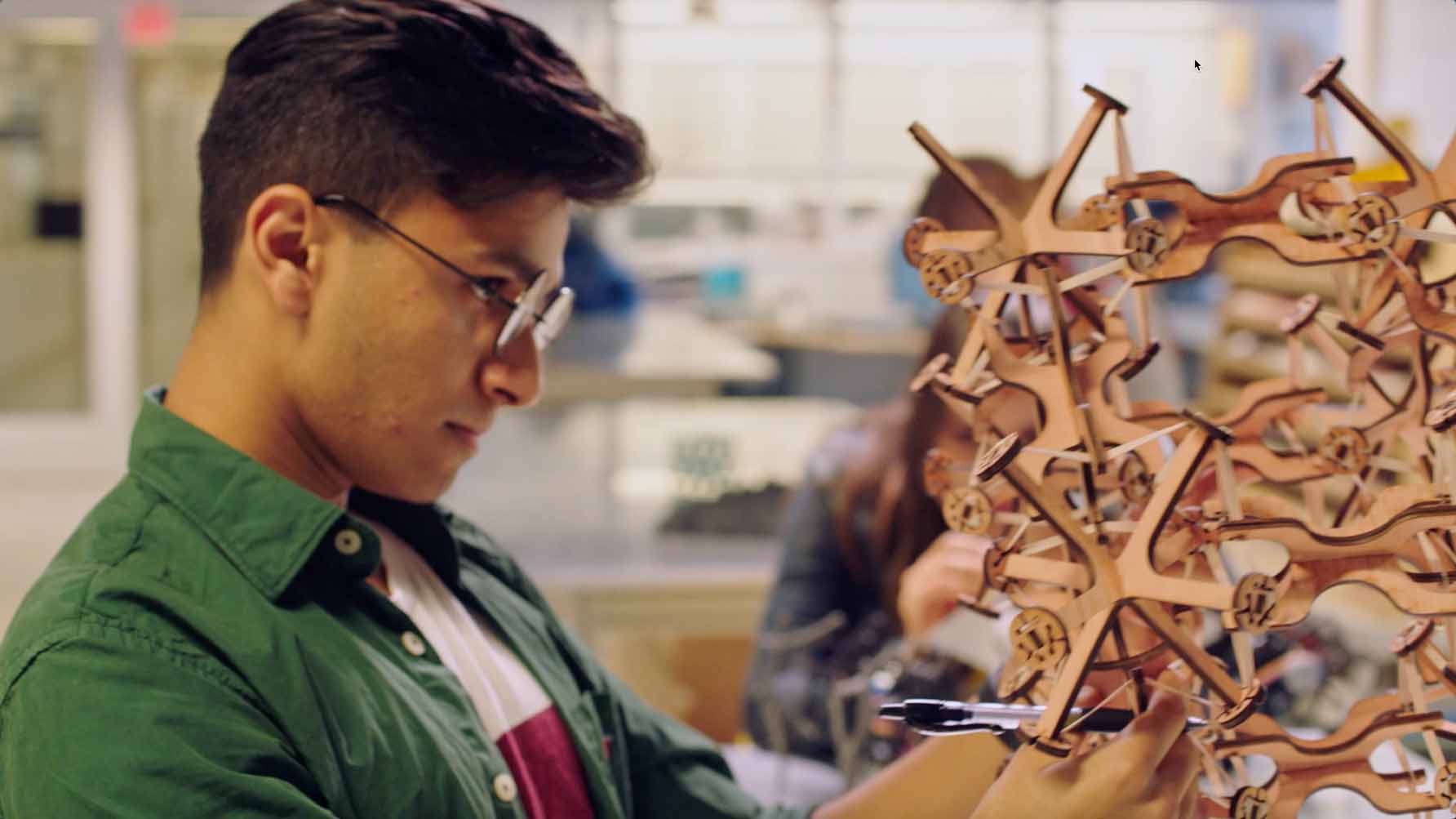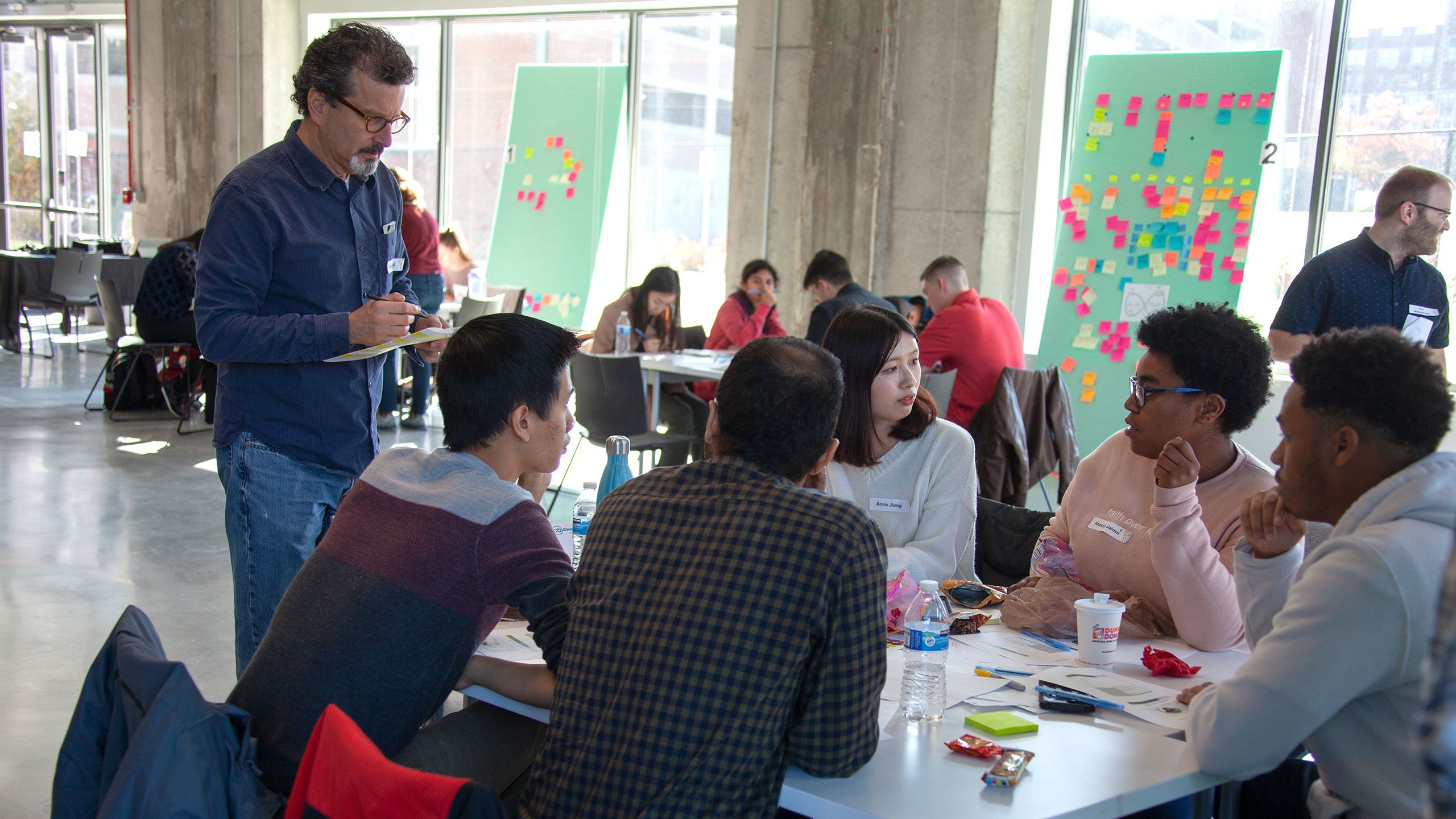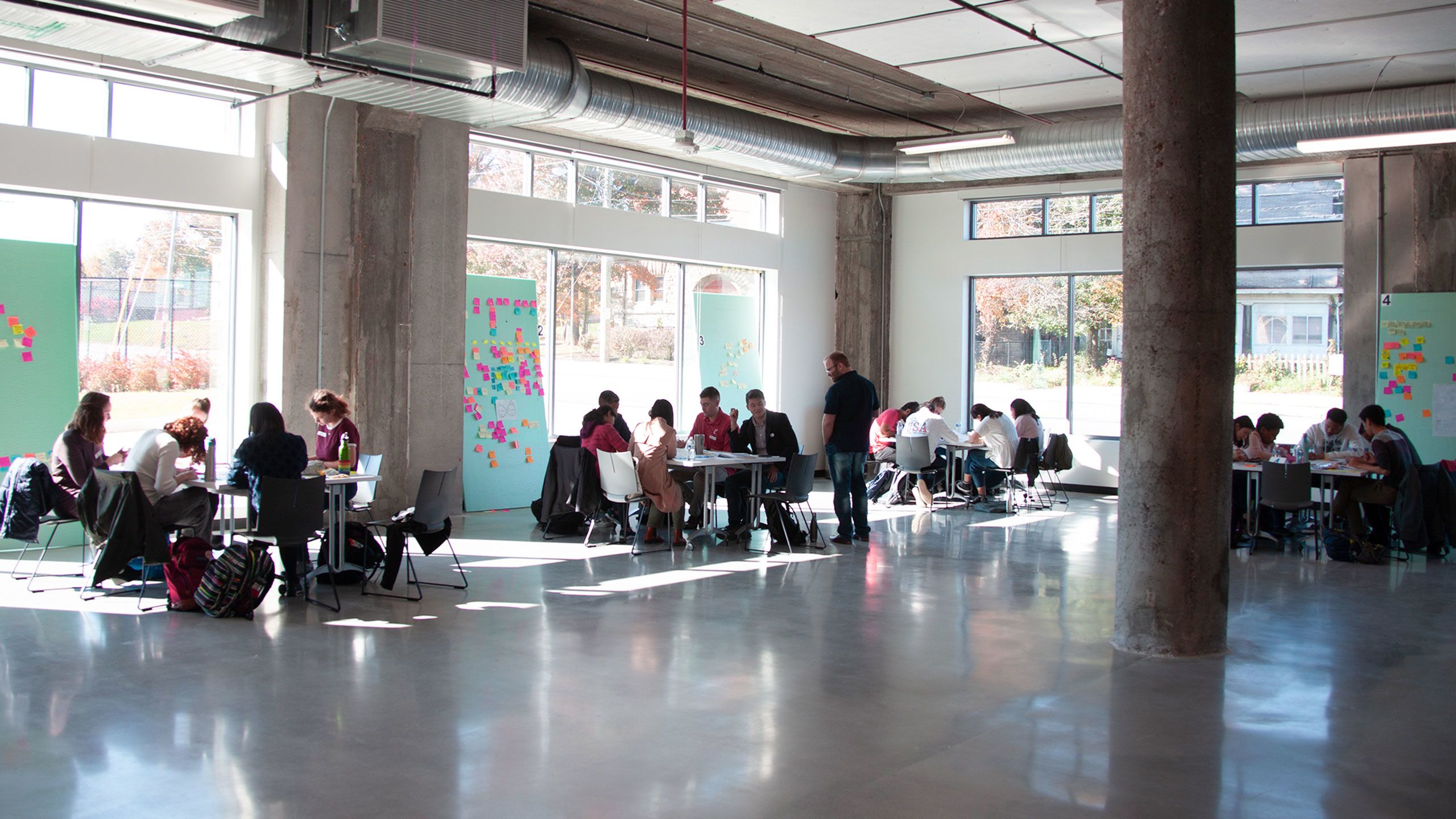Learn and launch:
Where university meets industry

Boundaries don’t break themselves, and businesses don’t build themselves.
It’s why the University of Cincinnati has a startup ecosystem that readies students, along with faculty, staff, alumni and partners, to deep dive fast – really fast – in pooling know-how, resources and research to find solutions around today’s most pressing challenges.
That ecosystem is rooted in the university’s new 1819 Innovation Hub and its Venture Lab – key components of the university’s strategic direction, Next Lives Here.
A six-month sprint for the first startup – founded by two recent graduates – has already resulted in invention disclosures, patents filed, express licensing and funding. The pair has incorporated Amplify Sciences, a startup which promises – in the short term – an easy, at-home flu test that requires only a saliva sample. In the long term, the platform of this development promises to redefine the $17 billion lab-test industry.
NEXT LIVES HERE

As our Next-minded President Neville Pinto says, “Life is faster. The globe is smaller. Technology is smarter. Expectations are higher. The pace of change is hyper-realized.
“At every turn, these uber-changes demand more of us and from us. The choice is subtle but significant: Lead by design or follow by default.”
That’s the reality propelling UC’s 1819 Innovation Hub and Venture Lab, according to Assistant Vice President of Commercialization Jason Heikenfeld, an award-winning faculty member and serial entrepreneur.
“The traditional system for most university startups is based on a faculty researcher with a patent, and it could take 3 or 4 years to gain momentum,” says Heikenfeld. “But that no longer serves. Realistically, we have a different world every 3 or 4 months in most industries. The value proposition changes quickly. And our entrepreneurial impact cannot be limited to faculty. At UC, we have nearly 46,000 students, and they have ideas too. Our students cannot wait years to implement their ideas."
That first startup, Amplify Sciences, founded by UC grads Andrew Jajack, ’18, and Eliot Gomez, ’14, is bringing to market a flu test that reads saliva and can be used at home.
And the development is nothing to sneeze at in terms of its larger implications.
Today’s flu tests are so uncomfortable, they must be administered by healthcare professionals. Amplify Sciences’ ease of use is rivaled only by its unparalleled detection capability.
“Flu detection made the most sense from a business standpoint, but we could just as easily have pursued creating tests for things like malaria, RSV, and STDs,” explains Jajack. “Disease detection is just one of several potential applications. This technology can be used to quickly test food quality or monitor the presence of pharmaceuticals in drinking water.
WHY WAIT TO CHANGE THE WORLD?
Amplify Sciences is the first of what promises to be many fast-tracked applications for UC research and discoveries.
The Venture Lab works with small teams of faculty, students, staff and alumni. Each cohort works with entrepreneurs in residence, partner accelerators and potential funders, as well as business and industry partners – Kroger, Inc., Procter & Gamble, CincyTech, Cincinnati Bell – also located within the 1819 Innovation Hub.
During the seven-week cycle, Venture Lab helps would-be entrepreneurs learn how to define the problem they hope to solve, discover customers, perform landscape market analysis, and ultimately pitch their business ideas to potential investors.
Their research, ideas and solutions run a seven-week cycle of valuable third-party guidance and feedback and an ultimate “go” – “no go” – “go back” assessment.
What makes it different? Volume and speed.
Instead of focusing on predicting success – and most universities don’t have great track records for doing so – Venture Lab prepares teams quickly to present so that the outside world can inform them if they have a winning value proposition. On the last day of the program, Venture Lab companies pitch their businesses to a room of potential investors.
Renee Seward, a design faculty member who developed a literacy tool, called See Word, to help children and students with dyslexia, graduated from Venture Lab’s seven-week boot camp in October. But completing the program was a mere formality; she had already attracted the financial support needed to launch her new company – even before giving her business pitch during the pre-accelerator’s final we
“Without the support and education provided by Venture Lab, I would not have been able to launch my business,” says Seward.


HISTORY OF “HIRE EDUCATION”

When it comes to applied applications of academic research and technology, UC’s newly opened 1819 Innovation Hub builds on more than a century of student and faculty partnerships with business and industry. UC is the global birthplace of cooperative education, where students alternate time in the classroom with semesters of paid, professional work related directly to their majors – and earn a collective $66 million annually from more than 1,300 global employers. UC is home to the nation’s largest mandatory co-op program.
That co-op foundation informed classroom instruction and research over the past 110 years. The academics-to-application tradition was also evident in the Bearcat Launchpad, the first student-led accelerator in the nation, as well as a Center for Entrepreneurship and Commercialization.
That co-op foundation informed classroom instruction and research over the past 110 years. The academics-to-application tradition was also evident in the Bearcat Launchpad, the first student-led accelerator in the nation, as well as a Center for Entrepreneurship and Commercialization.
A NEW FRONT DOOR
Navigating UC’s 14 colleges and more than 6,800 full- and part-time faculty members was once a major challenge for companies that wished to tap into UC talent. The 1819 Innovation Hub provides one front door for business and industry partners to connect with students, faculty, staff, alumni, and each other.
It’s about far more than efficiencies, however. It’s a mindset.
“Innovation can be taught,” explains UC Chief Innovation Officer David J. Adams. “Companies of all sizes know this, and are co-locating near major research universities to not only teach themselves, but teach potential future employees how to innovate. Learning has to be a mindset, not a major. Through the university’s new strategic direction, we are reframing learning. When students are inspired, they motivate everyone around them.”
The ultimate goal, he adds, is not to respond to the future but to form and shape that very future.
The university is uniquely placed to do just that, in part thanks to the national spotlight turned on the Cincinnati region. Since 2014, Cincinnati has seen a 353 percent growth in the number of startups. It’s the reason why Forbes just placed Cincinnati on the list of the “Top 10 Rising Cities for Startups.”
To take further advantage of this momentum and UC applied research specialties in sensors, robotics, smart transportation, cybersecurity, artificial intelligence, augmented and virtual reality, and quantum computing, the university will soon lease a Digital Futures Building next to the 1819 Innovation Hub. These university facilities anchor one end of the region’s emerging innovation district, with other anchors including a new $110-million National Institute for Occupational Safety and Health research facility.
“Cincinnati’s growing innovation district gives talent-hungry companies across the globe access to UC students, faculty, and research, along with ongoing education for their workforces.” states Adams.
The developing physical and operational infrastructure will enhance existing UC specialties and projects like:
· UC artificial intelligence recently won out during simulated aerial combat against U.S. expert tacticians.
· Drone research looking to move packages from moving delivery trucks to your doorway.
· UC drone to help fix traffic gridlock from the skies.
· Medical startup uses UC know-how to detect brain bleeds.
· UC students in high-stakes international competition to reinvent transportation.
· Virtual defense: UC leads the charge to strengthen cybersecurity




